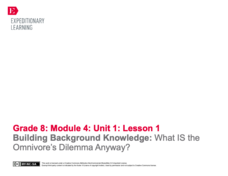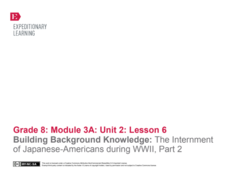EngageNY
Building Background Knowledge: The Dinka and Nuer Tribes Until the Mid-1980s (“Sudanese Tribes Confront Modern War” Excerpt 1) (Version 1)
Readers consider comparisons between the Dinka and Nuer tribes in South Sudan, making connections between an informational article about Sudanese tribes and the novel A Long Walk to Water by Linda Sue Park. They annotate the text to help...
EngageNY
Building Background Knowledge: The Lost Boys of Sudan
Get deep! Teach scholars how to make connections between texts to deepen their understanding of a topic. Using the resource, pupils read and annotate a short informational text about Sudan's Civil War and refugee crisis. Next, they...
EngageNY
Reading for Gist and Answering Text-Dependent Questions: Local Sustainable Food Chain
Readers use sticky notes and a Reading Closely: Guiding Questions handout to record the gist of a different section (pages 161-166) in The Omnivore’s Dilemma. They then pair up and share their ideas. To end the lesson, readers complete...
EngageNY
Mid-Unit Assessment: Analyzing Author’s Purpose in Speech and Text
Part one of a mid-unit assessment relating to The Omnivore’s Dilemma includes listening to and analyzing a speech by Birke Baehr. Part two involves analyzing an excerpt from the text. The assessment ends with short response questions.
EngageNY
Building Background Knowledge: What IS the Omnivore’s Dilemma Anyway?
What's the best thing on the menu? Scholars enter the room, complete a gallery walk of menus to choose a food to pretend to order, and then discuss how they made the decision. Next, they read The Omnivore's Dilemma and relate their...
EngageNY
End of Unit 3 Assessment: On-Demand Writing— Photograph and Song Choices for a Film
Ready, set, write! Every great film begins with a script, and every presentation starts with a plan. Directors use their research and experience to compose an essay explaining the rationale behind their film's musical and visual choices...
EngageNY
Building Background Knowledge: The Internment of Japanese-Americans during WWII, Part 2
Scholars learn about primary sources with a Primary Sources: Japanese-American Internment during World War II packet. Pupils work with a partner to read challenging sources in the packet while making notes in the margins. They then...
National Woman's History Museum
Defying British Rule: Women's Contributions to The American Revolution
Primary and secondary sources are the focus of a lesson that showcases the important role women played during the American Revolution. Pairs review sources and discuss their findings. A close-reading of an informational text leads the...
EngageNY
Researching Miné Okubo: Gathering Textual Evidence
Scholars read two texts about Miné Okubo’s life. In Riverside’s Miné Okubo and Miné Okubo, readers gather information to write narrative essays describing how Okubo became visible again. The essay serves as part of a performance task.
EngageNY
Launching the Module: The Universal Appeal of Shakespeare, Part 1
Class members participate in a gallery walk, viewing images of Shakespeare and his plays. Additionally, pupils complete a T-chart to consider the advantages and disadvantages of learning about Shakespeare with images and text.
EngageNY
Launching A Midsummer Night’s Dream: The Universal Appeal of Shakespeare, Part 2
As scholars prepare to read Shakespeare's A Midsummer Night's Dream, they first read the article "Shakespeare's Universal Appeal Examined" and analyze its central idea. Next, pupils complete Frayer Model worksheets to understand better...
EngageNY
Mid-Unit Assessment: Analyzing an Author’s Argument and Text Structure
William Shakespeare: a writer, a poet, a fake? For their mid-unit assessments, scholars read an excerpt from the article "The Top Ten Reasons Shakespeare Did Not Write Shakespeare" by Keir Cutler. Next, they analyze the author's argument...
EngageNY
Analyzing Text Structure: “The Shakespeare Shakedown”
Pupils continue reading and discussing Simon Schama's article "The Shakespeare Shakedown." They work together to analyze the article's paragraph structure, completing a note-catcher worksheet.
EngageNY
Analyzing the Central Claim and Supporting Claims: “The Shakespeare Shakedown”
Scholars continue to analyze Simon Schama's article "The Shakespeare Shakedown." They participate in a jigsaw discussion to identify the author's argument and supporting claims. Pupils also write objective summaries of the text.
EngageNY
Analyzing the Author’s Perspective: “The Shakespeare Shakedown”
Simon Schama's article "The Shakespeare Shakedown" allows young writers to see how authors respond to conflicting viewpoints. Class members participate in discussion appointments with five peers to explore the author's point of view.
EngageNY
The Authorship of Shakespeare: “The Shakespeare Shakedown”
Pupils conduct a close reading of "The Shakespeare Shakedown" by Simon Schama, and identify evidence the author uses to support his claims. Finally, they discuss and answer text-dependent questions before completing a Quick Write about...
EngageNY
Finishing Who? Where? and Why? Research
Who? Where? Why? Scholars answer these questions to help identify the gist of Inside Out & Back Again. First, they add text evidence to their research folders. They then begin looking at a performance task in which they write their...
California Education Partners
Follow the Water by Arthur Dorros
Assess scholars' reading and writing capabilities with an exam that challenges learners to respond to an informative text. Through note-taking and peer discussion, pupils analyze a passage from the story, Follow the Water from Brook to...
California Education Partners
We Are The Ship
An assessment sheds light on scholars' ability to read, gather evidence, and draft an original written composition. Learners read an informative text twice before taking notes and discussing their thoughts and textual evidence with a...
California Education Partners
Telescopes
An assessment challenges scholars to read an informative text then respond with an explanatory essay. The exam begins as participants read a text passage twice then take notes, making sure to jot down key details. Following the...
California Education Partners
Seeing Eye to Eye
A performance task challenges scholars to read an informational text then respond with an explanatory essay. The exam begins with an independent reading of Seeing Eye to Eye by Leslie Hall. A second reading follows with the completion of...
California Education Partners
Quest for Tree Kangaroo
A three-day assessment challenges scholars to read a passage from an informational text then complete two activities that lead to a writing assignment. Day one and two begin as readers independently read a passage and tag the most...
California Education Partners
My Librarian is a Camel
A two-part assessment challenges scholars to gather information from reading then write an opinion piece. In part one, learners read, take notes, and answer text-related questions. In part two, participants use their new-found knowledge...
EngageNY
End of Unit Assessment: How Word Choice Contributes to Tone and Meaning
It's finally time for pupils to show what they know! Scholars finalize the unit with an end-of-unit assessment. They use the book Inside Out & Back Again and the "Forgotten Ship" transcript to examine word choice, tone, and...

























